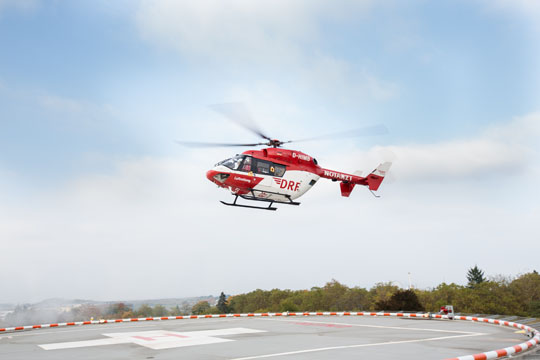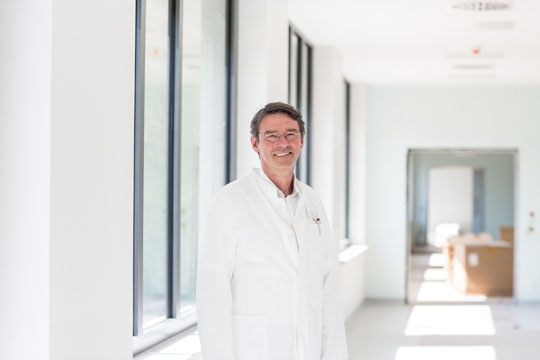Alive Thanks to Personalized Blood
Freiburg, Jun 14, 2017
ResuSciTec saves lives. The Freiburg University Medical Center spin-off has created CARL, a unique device that improves patients' chances of surviving an acute cardiac arrest – without serious damage. Currently, roughly nine out of ten patients do not survive.
 For use in an emergency: The spin-off company ResuSciTec has developed a machine that improves the chances of surviving a cardiac arrest.
For use in an emergency: The spin-off company ResuSciTec has developed a machine that improves the chances of surviving a cardiac arrest.
Photo: Freiburg University Medical Center
A cardiac arrest can cause permanent brain damage after only three minutes, and the chances of survival drop rapidly after only five minutes. "If the cardiac arrest occurs while the patient is in the hospital, an average of one out of five patients survives," said Prof. Dr. Friedhelm Beyersdorf, the medical director of the Clinic for Cardiovascular Surgery at the Heart Center of the Freiburg University Medical Center. However, almost half of all survivors incur serious brain damage, he added. That is why he initiated the startup company ResuSciTec (http://www.resuscitec.de/) in 2012. Ninety-seven out of every one hundred patients who suffer a cardiac arrest outside the hospital die, and only one of the survivors does not incur neurological damage.
 The startup ResuSciTec was initiated by the heart specialist Friedhelm Beyersdorf.
The startup ResuSciTec was initiated by the heart specialist Friedhelm Beyersdorf.
Photo: Freiburg University Medical Center
CARL Surpasses All Expectations
Prof. Dr. Beyersdorf and his colleagues began using CARL to treat patients in 2014. The treatment, which is called "controlled automatic reperfusion of the whole body," also lent its name to CARL, a machine that weighs 20 kilos (about 44 pounds). Of the ten people who were treated for a cardiac arrest outside of the hospital, six survived – all without brain damage. One of the survivors arrived at the Freiburg University Medical Center after a full 151 minutes of CPR. The heart specialist is still amazed about that to this day: "That someone like that can leave the hospital on their own two feet was something we didn't expect." The rate of survival for a cardiac arrest has remained low for decades, despite the fact that acute cardiac arrest is by no means a rare occurrence. Roughly 200,000 cases of cardiac arrest occur every year in Germany, and most are triggered by a heart attack.
Blood Personalized to Fit the Patient's Needs
In the past, normal blood was used for reperfusion, or the restoration of blood flow. "But that's only suitable for normal, healthy bodies," Prof. Dr. Beyersdorf said. This is because, after a cardiac arrest, the lack of oxygen in the blood severely damages tissue, meaning normal blood does more harm than the initial lack of oxygen. For the first time, CARL will be able to administer personalized blood to patients. The device draws the patient's blood just like a heart-lung machine, then it enriches this blood with oxygen. It also measures certain blood levels – up to 11 parameters simultaneously – after which it adjusts the blood accordingly. The personalized blood is then redirected back into the blood flow.
A Host of New Abilities
"CARL is a brand new type of machine," Prof. Dr. Beyersdorf said. It can do much more than what was impossible until now. "For the first reperfusion, pressure has to be very high," he said. In order to achieve this, CARL operates with two pumps, which even develop a pulse wave, or an ebb and flow in pressure. "This is necessary for the tissue cells in the brain," he said. During the procedure, CARL constantly monitors the patient's blood pressure and supplies the patient with oxygen primarily by drawing air from the room. An integrated cooling unit also lowers the patient's body temperature by three to four degrees Celsius within 30 minutes in order to protect all the body's cells. This is almost 10 times as fast as any other machine.
Progress Off to a Bumpy Start
More than 10 years of research were necessary to get CARL to work correctly. The project was slowgoing, Prof. Dr. Beyersdorf said. There was not enough staff, or enough space, or it was something else altogether. Yet, the team continued to hold talks throughout. "Then we suddenly noticed that other researchers were beginning to copy us," Prof. Dr. Beyersdorf said, adding with a wink: "That was just what we needed." They realized that the project was in need of fresh motivation and funding to be able to stay ahead, expand, and produce a useable result. The heart specialist then suggested launching a spin-off company, which almost failed. "The first two tries went south," he admits.
Third Time's A Charm
Their first attempt, a venture capitalist tried to take over the spin-off company. "There was no place for us in their long-term planning," Beyersdorf said. Then, an internationally-renowned expert and employee of the spin-off spooked potential investors when he unexpectedly proved to be incompetent. Fortunately, the third launch was successful and brought the medical technology company KLS Martin GmbH & Co. KG from Umkirch and the Zukunftsfonds Heilbronn on board. Prof. Dr. Bernhard Arnolds, the director of the Technology Transfer Office at the University of Freiburg, was immensely helpful during the spin-off process, said Beyersdorf, adding, "Now things are going very well." Beyersdorf has built up ResuSciTec together with the heart surgeon and lecturer Dr. Georg Trummer and the perfusionist Prof. Dr. Ing. Christoph Benk. "Generally speaking, we are extremely lucky to have the staff and partners that we do."
Rollout Planned for 2018
ResuSciTec is currently on solid footing, and CARL is internationally patented. The basics have been covered through their own experiments. All that is left is to acquire the European CE marking and conduct a large patient study in several European clinics and hospitals. "Then we can start thinking about selling our device," Beyersdorf said. Everything should be ready by 2018. By then, development is expected to have cost roughly 16 million euros. That's a small sum compared to the many lives CARL could save, says Beyersdorf. He's also proud of Southern Baden as a center of research: "It would be fantastic if we could improve the number of survivors by 100–200% using the 'Freiburg Resuscitation Method'!"
Jürgen Schickinger

